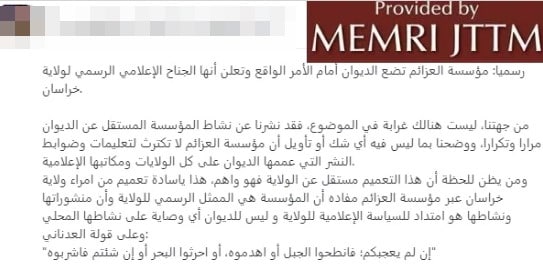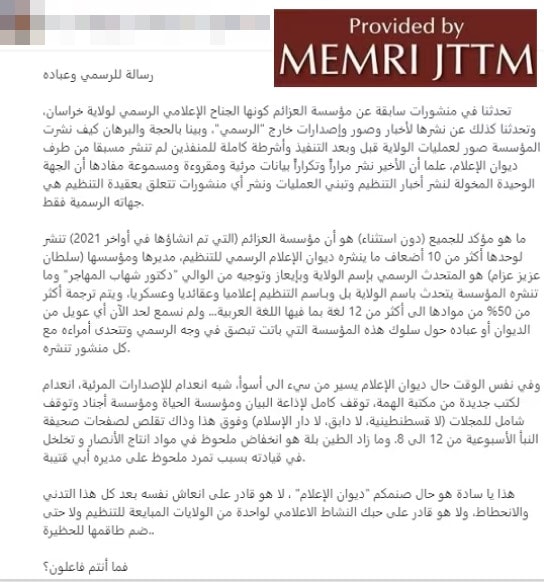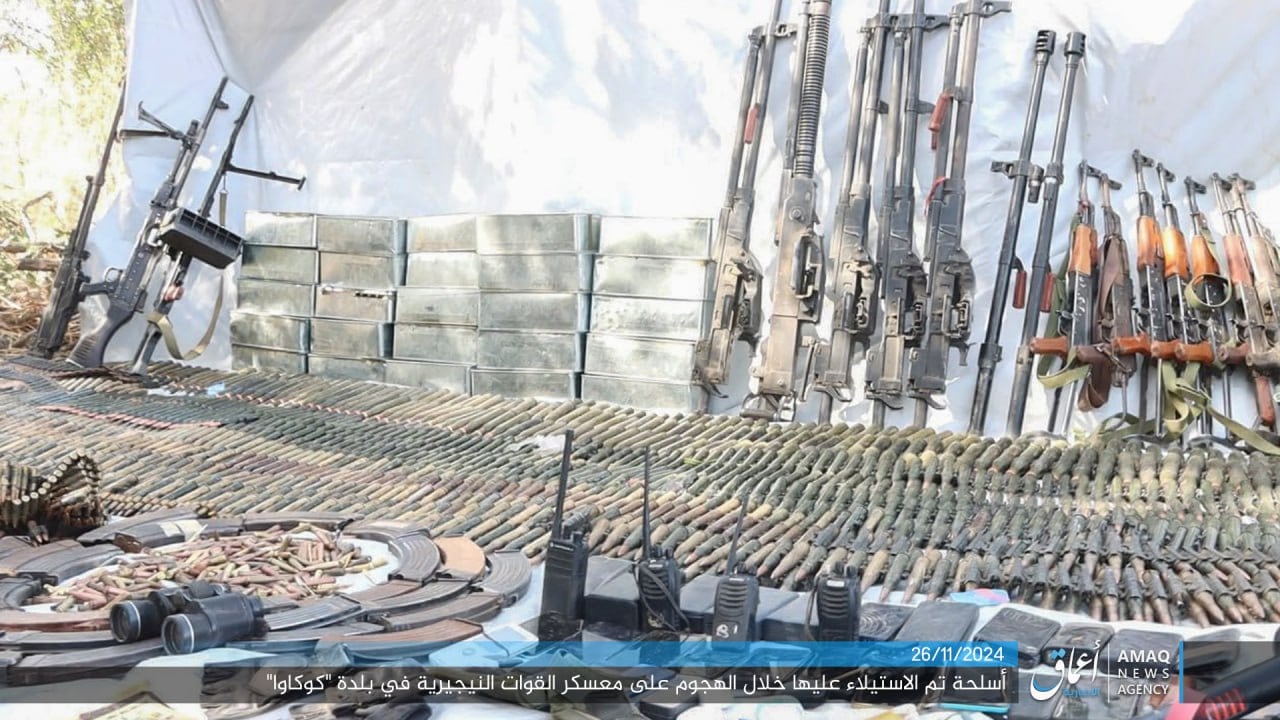The following report is now a complimentary offering from MEMRI's Jihad and Terrorism Threat Monitor (JTTM). For JTTM subscription information, click here.
On July 1, 2024, an anti-Islamic State (ISIS) channel on the Al-Qaeda-operated Rocket.Chat server, "Qanat Fadh 'Ubbad Al-Baghdadi Wal-Hashemi" [the Channel to Expose the Worshippers of Al-Baghdadi and Al-Hashemi], published a post arguing that Al-Azaim Foundation for Media Production, a media outlet linked to the Islamic State Khorasan Province (ISKP) which had often described itself as a supporting entity for the Islamic State (ISIS), acts independently of the official ISIS Media Bureau, and ignores the organization's central directives.[1]
Since its emergence in 2021, Al-Azaim Foundation has proved to rank among the most active ISIS-linked propaganda outlets. It consistently disseminates the ISIS narrative of ISIS actions in nine languages - English, Arabic, Azerbaijani, Farsi, Pashto, Tajik, Turkish, Russian, and Uzbek. It is also the spearhead of ISIS-inspired threat messaging monitored during the past several months, encouraging attacks worldwide against Christians and Jews in countries it considers promoting an anti-Islam, anti-Muslim agenda.[2]
On June 28, 2024, Al-Azaim Foundation announced it would start broadcasting material in the Urdu language as part of its ongoing expansion, further demonstrating the importance of Afghanistan for ISIS media.[3]
Official Al-Azaim "Represents Own Policies, Not Those Of ISIS"
Interestingly, although often perceived as an unofficial outfit, Al-Azaim Foundation opened its June 28 announcement poster in English, presenting itself as ISKP's "official media outlet," saying that broadcasting in Urdu represents an addition to its media output broadcast in ten "important languages of the region and the world."

Commenting, the anti-ISIS channel argued it has repeatedly highlighted Al-Azaim Foundation's independence from ISIS's Central Bureau of Provinces, declaring that with the current announcement, Al-Azaim Foundation is run by ISKP leadership, and officially represents its own policies, not those of ISIS's central media.
Lingering Discrepancies
Additionally, the channel shared a 2015 internal circular criticizing unapproved media releases and banning branch leaders and other media operatives from releasing media statements, owning social media accounts, or cooperating with any other unaffiliated media foundations.
On July 30, 2022, Al-Azaim Foundation disseminated media content without obtaining ISIS Central Media Bureau approval. The anti-ISIS channel claimed that the disseminated material documenting ISKP attacks against Taliban members in Kabul "had not been sanctioned by ISIS's central media authority, and that Al-Azaim "is not authorized to publish visual content before the central media office, or on its behalf."[4]

Declining Central Media Authority And Production
According to the channel, Al-Azaim Foundation media's productivity is ten times that of ISIS's official media Bureau production. The Foundation is overseen by its director and founder, and relies on ISKP's spokesman, Sultan 'Aziz 'Azzam, and functions over the overall command of the Wali [Governor] Shihab Al-Muhajir.
The channel further argued that ISIS's Media Bureau, as well as the organization's supporters, who often call for total adherence to ISIS's official messaging as the main go-to literature, have not voiced opposition to a media outlet, which publishes material in several languages "in the name of the province, and even in the name of the organization [ISIS], ideologically, militarily, and publicly, to other media outlets."
The channel further opined that the state of affairs of ISIS's top media authority is worsening, amid non-existent video production and new books. There has also been a noticeable decline in ISIS supporters' productivity, according to the channel.

[1] June 28, 2024.
[2] Media Outlet Linked To Islamic State Khorasan Province (ISKP) Publishes Poster Instructing Lone Wolves To Commit Arson In 'Jewish, Crusaders' Towns' In U.S., U.K.; Says It Will Begin Publishing Urdu Content, July 1, 2024.
[3] See MEMRI JTTM Report: Media Group Linked To Islamic State Khorasan Province (ISKP) Publishes Posters Instructing Lone Operatives, Threatening Attacks With Explosives In The West, June 25, 2024.
[4] See MEMRI JTTM Report: Anti-ISIS Channel: 'Uncoordinated Media Releases By ISKP Exposes ISIS Central Media Office's Lack Of Control Over Its Afghanistan Media Branch', August 5, 2022.
The full text of this post is available to subscribers.
Please login or register to request subscription information from MEMRI








